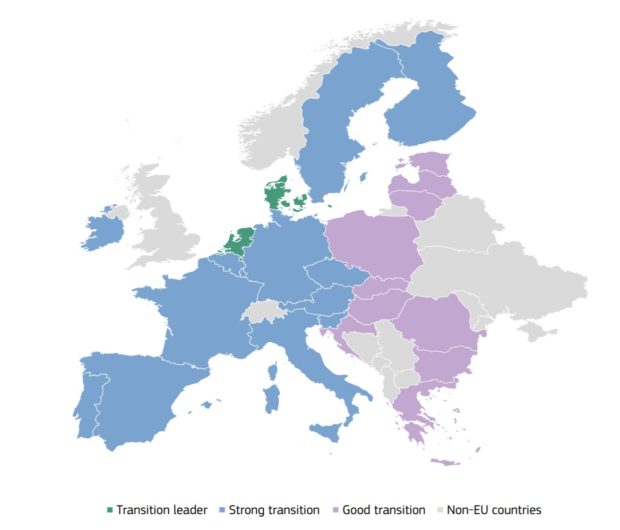The European Union is a strong global performer in the transition towards sustainability, with Denmark and the Netherlands topping the EU ranking and outperforming the US and China. These are some of the main results of the new Transitions Performance Index (TPI), published by the Commission today. It ranks EU Member States and 45 other countries across the globe on how they have performed from 2010 to 2019, both overall and in the four sustainability dimensions – economic, social, and environmental and governance, helping the EU achieve the Sustainable Development Goals and delivers on its priorities.
The index shows that EU countries have all progressed well over the last decade in their transitions performance, with an average improvement rate of 6.5%, compared to the global average rate of 5.4%. Moreover, the different starting points have not proven to be key to progress: some strong performing countries have continued to advance impressively and lesser performers have succeeded in catching-up.
Mariya Gabriel, Commissioner for Innovation, Research, Culture, Education and Youth, said: “To preserve the Earth for future generations while ensuring our resilience and well-being, we have to transform our economies and societies. Our recovery from the pandemic has to be based on sustainability. We are not just rebuilding the economy – we are building it back different and better. Тhe new Transition Performance Index will help us make sure we invest in our future in a sustainable and responsible way.”
The index shows that all EU countries have improved their performance since 2010, particularly Croatia, with an exceptional increase (20.5%), as well as Ireland and Luxembourg (progress above 10%). The sharp increase in the Netherlands’ TPI score demonstrates that a country can continue to make progress even from a leading position, while many strong performers continue to progress at high speed. The two countries topping the EU ranking, Denmark and the Netherlands, are also transition leaders overall, outperforming the United States and China.
Several countries (Croatia, Ireland, Luxembourg, Slovakia, Estonia, the Netherlands, Czechia, Italy, Poland, Romania, Belgium, Malta, Lithuania and Germany) progressed above the EU average (6.5%). Latvia, Denmark, Spain, Greece, France, Austria, Slovenia, Sweden and Bulgaria all progressed above 4%. In contrast, strong performers such as Finland and Portugal, as well as Cyprus and Hungary, Finland, Sweden and Slovenia seem to have come to a standstill and are at risk of losing ground in the transition process unless they renew their collective efforts.
Countries among the TPI transition leaders are also among the strong performers in social and governance transitions. Democracy, sustainability and prosperity go hand in hand.
On the other hand, there is significant scope for improvement as no one EU country leads across all four dimensions. In particular, there is a need to improve economic and environmental transitions performance across the EU.
Countries with low GDP per capita figure in the top third along some dimensions of the TPI. At the same time, countries with an overall good TPI scores lag in certain pillars, illustrating the specific characteristics of each of the four dimensions of the Index.
The findings highlight the crucial role investment in research and innovation has to support the path to recovery towards a fair and prosperous sustainability and is accompanied by 72 country-specific descriptions of progress made over a period of ten years, along with an interactive website allowing for country comparison.
Following up on the latest European Semester package published on 18 November, the TPI aims to help Member States identify and isolate those areas where priority action is needed to facilitate the fourfold transition. It comprises 25 internationally comparable indicators, with specific goalpost reflecting the six priorities of the Commission: A European Green Deal, A Europe fit for the digital age, An Economy working for people, A stronger Europe in the world, A European way of Life, A new push for European Democracy and the United Nations Sustainable Development Goals. It also aims at giving more visibility and traction to the annual Eurostat Sustainable Development Goals monitoring report. The independent statistical audit performed by the Joint Research Centre validated the statistical methodology and the robustness of results.



